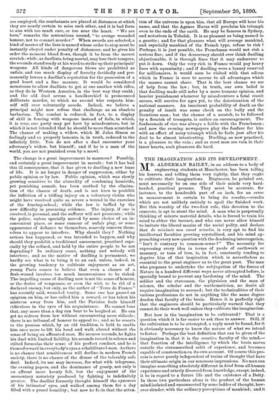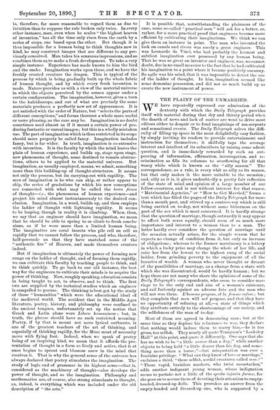THE IMAGINATION AND ITS DEVELOPMENT..
MR. ALDERMAN BAILEY, in an address to a body of engineering students at Manchester, has been telling his hearers, and telling them very rightly, that they ought to cultivate their imaginations. Engineers, he pointed out, must necessarily be on one side of their minds very hard- headed, practical persons. They must be accurate, for instance, to the hundredth part of an inch, for an error in measurement is certain to bring its results,—results which are not unlikely entirely to spoil the finished work. But this worship of the two-foot rule, this devotion to the concrete, is apt to stunt the mind. A man who is perpetually thinking of minute material details, who is forced to train his mind to abhor the inexact, and who can never allow himself to imitate the liberal maxim of the social polity, and declare that de minimis non curat scientia, is very apt to find his intellectual faculties growing crystallised, and his mind ap- proaching every new question with the deadening interrogation, "Isn't it contrary to common-sense ?" The necessity for expressing every idea in terms of yards of earthwork or masonry, or tons of iron, is, in fact, constantly tending to deprive him of that inspiration which is nevertheless as essential to the great engineer as to the great poet. The man who proposes to undertake the subjugation of the forces of Nature in a hundred different ways never attempted before, is specially bound to prevent any hardening of the mind. The soldier and the statesman, the physician and the man of science, the scholar and the mathematician, no doubt all require imagination to succeed ; but the technicalities of their various professions do not in anything like the same degree deaden that faculty of the brain. Hence it is perfectly right that the engineers should be particularly warned that they cannot do their work well unless they cultivate the imagination.
But how is the imagination to be cultivated ? That is a question which it is far easier to ask than to answer. Still, if the cultivation is to be attempted, a reply must be found, for it is obviously necessary to know the nature of what we intend to foster. Perhaps the best definition that can be given of the imagination is, that it is the creative faculty of the mind,— that function of the intelligence by which the brain moves outside the circumscribed orbit of experience, and becomes capable of construction on its own account. Of course this pro- cess is never purely independent of trains of thought that have their ultimate origin in our sensuous impressions. No man can imagine something absolutely different in kind from all human experience and utterly divorced from knowledge, except, indeed, it be in regard to a future life and the existence of a Deity. In these two particulars alone is the product of the human mind isolated and unconnected by some ladder of thought, how- ever slender, with the ordinary perceptions of mankind; and it
is, therefore, far more reasonable to regard them as due to intuition than to suppose the rule broken only twice. In every other instance, man, even when he scales "the highest heaven of invention," has all the time only risen from the earth by a series of steps, one based upon the other. But though it is thus impossible for a human being to think thoughts new in kind, he may construct images that are different to any pre- viously conceived. Man takes his sensuous impressions, and so combines them as to make a fresh development. To take a very simple instance. Experience has made known to him the bird and the snake. Imagination works upon these, and we have the freshly created creature the dragon. This is typical of the process by which is being gradually built up the whole fabric of human thought, and by which every fresh invention is -made. Nature provides us with a view of the material universe in which the objects perceived by the senses appear under a certain configuration. The imagination, however, gives a turn to the kaleidoscope, and out of what are precisely the same materials produces a perfectly new set of appearances. It is not satisfied with the order of Nature, but "selects the parts of different conceptions," and forms thereout a whole more useful or more pleasing, as the case may be. Imagination is no doubt sometimes used almost as if it meant a certain power of pro- -ducing fantastic or unreal images; but this is a wholly mistaken use. The part of imagination which is thus restricted in its scope should more properly be called fancy. Imagination includes fancy, but is far wider. In truth, imagination is co-extensive with invention. It is the faculty by which the mind leaves the plain of human experience, and builds up, stage upon stage, new phenomena of thought, some destined to remain abstrac- tions, others to be applied to the material universe. But imagination, as usually employed, means, we admit, something more than this building-up of thought-structures. It means not only the process, but its carrying-out with rapidity. The man of imagination is he who can skip, or rather appear to skip, the series of gradations by which his new conceptions are connected with what may be called the terra firma .of thought—i.e., the phenomena of human experience—and project his mind almost instantaneously to the desired con- clusion. Imagination, in a word, builds up, and then employs -the ladder of thought with lightning rapidity. It seems -to be leaping, though in reality it is climbing. When, then, we say that an engineer should have imagination, we mean that he should be able to spring to or climb to fresh conclu- sions, as if he were more than a limited human being. The imaginative are coral insects who pile cell on cell so rapidly that we cannot follow the process, and who, therefore, half-persuade us that they have snatched some of the " authentic fire" of Heaven, and made themselves creators indeed.
But if imagination is ultimately the power of forming new rungs on the ladder of thought, and of forming them rapidly, we can cultivate this faculty by teaching people to think, and to think quickly. To go back to our old instance, the best way for the engineers to cultivate their minds is to acquire the power of thinking. Now, roughly speaking, education consists in being taught to act, to observe, and to think. The first two are supplied by the technical studies which an engineer is compelled to pursue. The thinking is best got by the study of those " humanities " which were the educational ideal of the medimval world. The accident that in the Middle Ages literature, poetry, history, and philosophy were confined to the ancient tongues, unfortunately set up the notion that Greek and Latin alone were Literx humaniores ; but, in truth, the phrase should have no such restricted meaning. Poetry, if by that is meant not mere lyrical outbursts, is .one of the greatest teachers of the art of thinking, and especially of thinking rapidly, for the Muse must of necessity move with flying foot. Indeed, when we speak of poetry being of an inspiring kind, we mean that it affords the pre- sentation of thought in a form so lively and active, that it at -once begins to sprout and blossom anew in the mind that receives it. That is why the general sense of the universe has -always declared that poetry stimulates the imagination. The study of logic and of grammar in its highest sense—that is, -considered as the machinery of thought—also develops the power of thought, and so the imagination. Philosophy and -mathematics are, of course, also strong stimulants to thought, as, indeed, is everything which was included under the old -description of " the arts."
It is possible that, notwithstanding the plainness of the case, some so-called "practical men" will ask for a better, or, rather, for a more practical proof that engineers become more efficient by cultivating their imaginations. We think we can give them an instance in point. The man who invented the lock on canals and rivers was surely a great engineer. This was Leonardo da Vinci, who had probably the keenest and subtlest imagination ever possessed by any human being. That he was so great an inventor and engineer, was, we cannot doubt, due in no small measure to the fact that he had cultivated his imagination to a point where it became positively uncanny. So agile was his mind, that it was impossible to detect the use of the ladder of thought. In him, imagination seemed like some demoniac possession, and did not so mach build up as create the new instrument of power.



































 Previous page
Previous page